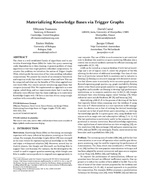Inproceedings3268: Unterschied zwischen den Versionen
Aus International Center for Computational Logic
David Carral (Diskussion | Beiträge) (Die Seite wurde neu angelegt: „{{Publikation Erster Autor |ErsterAutorVorname=Efthymia |ErsterAutorNachname=Tsamoura |FurtherAuthors=David Carral; Enrico Malizia; Jacopo Urbani }} {{Inprocee…“) |
David Carral (Diskussion | Beiträge) Keine Bearbeitungszusammenfassung |
||
| Zeile 15: | Zeile 15: | ||
|Abstract=The chase is a well-established family of algorithms used to materialize Knowledge Bases (KBs) for tasks like query answering under dependencies or data cleaning. A general problem of chase algorithms is that they might perform redundant computations. To counter this problem, we introduce the notion of Trigger Graphs (TGs), which guide the execution of the rules avoiding redundant computations. We present the results of an extensive theoretical and empirical study that seeks to answer when and how TGs can be computed and what are the benefits of TGs when applied over real-world KBs. Our results include introducing algorithms that compute (minimal) TGs. We implemented our approach in a new engine, called GLog, and our experiments show that it can be significantly more efficient than the chase enabling us to materialize Knowledge Graphs with 17B facts in less than 40 min using a single machine with commodity hardware. | |Abstract=The chase is a well-established family of algorithms used to materialize Knowledge Bases (KBs) for tasks like query answering under dependencies or data cleaning. A general problem of chase algorithms is that they might perform redundant computations. To counter this problem, we introduce the notion of Trigger Graphs (TGs), which guide the execution of the rules avoiding redundant computations. We present the results of an extensive theoretical and empirical study that seeks to answer when and how TGs can be computed and what are the benefits of TGs when applied over real-world KBs. Our results include introducing algorithms that compute (minimal) TGs. We implemented our approach in a new engine, called GLog, and our experiments show that it can be significantly more efficient than the chase enabling us to materialize Knowledge Graphs with 17B facts in less than 40 min using a single machine with commodity hardware. | ||
|Download=Vldb-trigger-graphs.pdf | |Download=Vldb-trigger-graphs.pdf | ||
|Projekt=DIAMOND | |Projekt=CPEC, DIAMOND, ScaDS.AI | ||
|Forschungsgruppe=Wissensbasierte Systeme | |Forschungsgruppe=Wissensbasierte Systeme | ||
}} | }} | ||
Version vom 14. Februar 2021, 19:22 Uhr
Materializing Knowledge Bases via Trigger Graphs
Efthymia TsamouraEfthymia Tsamoura, David CarralDavid Carral, Enrico MaliziaEnrico Malizia, Jacopo UrbaniJacopo Urbani
Efthymia Tsamoura, David Carral, Enrico Malizia, Jacopo Urbani
Materializing Knowledge Bases via Trigger Graphs
Proceedings of the 47th International Conference on Very Large Databases, VLDB 2021, to appear. Springer-Verlag
Materializing Knowledge Bases via Trigger Graphs
Proceedings of the 47th International Conference on Very Large Databases, VLDB 2021, to appear. Springer-Verlag
- KurzfassungAbstract
The chase is a well-established family of algorithms used to materialize Knowledge Bases (KBs) for tasks like query answering under dependencies or data cleaning. A general problem of chase algorithms is that they might perform redundant computations. To counter this problem, we introduce the notion of Trigger Graphs (TGs), which guide the execution of the rules avoiding redundant computations. We present the results of an extensive theoretical and empirical study that seeks to answer when and how TGs can be computed and what are the benefits of TGs when applied over real-world KBs. Our results include introducing algorithms that compute (minimal) TGs. We implemented our approach in a new engine, called GLog, and our experiments show that it can be significantly more efficient than the chase enabling us to materialize Knowledge Graphs with 17B facts in less than 40 min using a single machine with commodity hardware. - Projekt:Project: CPEC, DIAMOND, ScaDS.AI
- Forschungsgruppe:Research Group: Wissensbasierte SystemeKnowledge-Based Systems
@inproceedings{TCMU2021,
author = {Efthymia Tsamoura and David Carral and Enrico Malizia and Jacopo
Urbani},
title = {Materializing Knowledge Bases via Trigger Graphs},
booktitle = {Proceedings of the 47th International Conference on Very Large
Databases, {VLDB} 2021},
publisher = {Springer-Verlag},
year = {2021}
}
